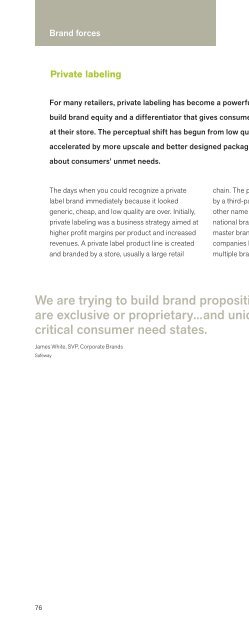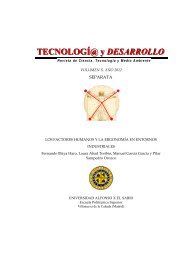- Page 4:
DesigningBrandIdentity
- Page 8:
Alina WheelerDesigningBrandIdentity
- Page 16:
Thank you to mycolleagues who share
- Page 20:
ProcessBest PracticesPart 2 present
- Page 24:
1 BasicsPart 1 illuminates the diff
- Page 28:
Brand touchpointsEach touchpoint is
- Page 32:
Brand identity implies an asset.Cor
- Page 36:
When to start the processNew compan
- Page 40:
Key stakeholdersAs the branding pro
- Page 44:
Reasons to invest in brand identity
- Page 48:
Who develops brand strategy?It is u
- Page 52:
Repositioning historySneakersIn the
- Page 56:
Less is moreAppleThink differentTar
- Page 60:
Moments of truthDonovan/Green ident
- Page 64:
Qualities of an effective nameThe r
- Page 68:
Types of brand architectureVarious
- Page 72:
Essential characteristicsA cross-se
- Page 76:
Fundamental principles of staying o
- Page 80:
Pay attentionNot every culture hasa
- Page 84:
Brand identity idealscoherencemeani
- Page 88:
Being a sustainable business isintr
- Page 92:
The logo is the gatewayto the brand
- Page 96:
Each day, 1.2 billion people around
- Page 100:
Courtesy of allmyfaves.com39
- Page 104:
Trademarks and their date of origin
- Page 108:
Vueling: Saffron Brand ConsultantsA
- Page 112:
Unilever leads its brands througha
- Page 116:
GE has a commitment toprotecting it
- Page 120:
Truvia natural sweetenerrepresents
- Page 124: Topology of marksThere are no hard
- Page 128: Name that brandArtist and cultural
- Page 132: Late July:Louise Fili Ltd.Dell:Sieg
- Page 138: Brand identity elementsPictorial ma
- Page 142: Brand identity elementsAbstract mar
- Page 146: Brand identity elementsEmblemsEmble
- Page 150: Brand identity elementsCharactersIt
- Page 154: Brand identity elementsLook and fee
- Page 158: Brand forcesBrand dynamicsWhat’s
- Page 162: Brand forcesSustainabilityMaking a
- Page 166: Brand forcesSocial mediaThe consume
- Page 170: Brand forcesBrand licensingLicensin
- Page 176: Private Label Brand Architecture St
- Page 180: HTTPS Https is “Hypertext Transfe
- Page 184: IdentityWho are you?FELLOWEMPLOYEES
- Page 188: New nameBeforeAfterThe new name is
- Page 192: BeforeAfterJefferson’s handwritin
- Page 196: BeforeAfterWe revolutionized Sesmar
- Page 200: 2 ProcessPart 2 presents a universa
- Page 204: Process is a competitive advantageA
- Page 208: Who manages the project?Client side
- Page 212: Metrics for brand management Source
- Page 216: Principles of collaborationDevelope
- Page 220: Red flagsThe CEO (or global brandma
- Page 224:
designImagineRealizeCelebrateSimpli
- Page 228:
Baseline information to requestRequ
- Page 232:
Quantitative researchHow the resear
- Page 236:
Ethnography is the holisticstudy of
- Page 240:
Request materialsThe following is t
- Page 244:
Understanding the competitionWho ar
- Page 248:
Criteria for evaluating communicati
- Page 252:
Essential characteristicsAnalysis r
- Page 256:
Phase 2 scenariosDifferent scenario
- Page 260:
Keep movingEngage in meaningful dia
- Page 264:
Brand brief schematicAttributesIden
- Page 268:
RememberNames may be registeredin d
- Page 272:
A designer’s perspectivePaul Rand
- Page 276:
We wanted to simplifyNickelodeon’
- Page 280:
A true measure of brandstrategy suc
- Page 284:
Color triviaKodak was the first com
- Page 288:
Typeface family basicsTypefaces are
- Page 292:
Branding soundMotorsHarley-Davidson
- Page 296:
Motion principlesDeveloped by Sagi
- Page 300:
Testing the conceptIdentity design
- Page 304:
Presentation basicsPresentation str
- Page 308:
Creative briefThe creative brief ca
- Page 312:
Brand identity legal basicsMythsOnc
- Page 316:
Letterhead design basicsNever desig
- Page 320:
Business card design basicsThink of
- Page 324:
Collateral system basicsUnified col
- Page 328:
Website basicsCharacteristics of th
- Page 332:
Left to right:ABCACLUAdobeAeroMexic
- Page 336:
Signage basicsSignage expresses the
- Page 340:
Characteristics of the bestconsumer
- Page 344:
Packaging basicsChampagne in a can,
- Page 348:
Coca-Cola:Turner DuckworthBranding
- Page 352:
Branded environment imperativesUnde
- Page 356:
Get your motor runnin’Head out on
- Page 360:
Uniform performance criteriaFunctio
- Page 364:
The possibilitiesAlarm clocksAlbums
- Page 368:
Spectrum Health in GrandRapids, Mic
- Page 372:
Biggest challengesDeveloped by Patr
- Page 376:
Strategic launch goalsExternal laun
- Page 380:
ARAMARK and the road showPublic com
- Page 384:
Characteristics and challengesEssen
- Page 388:
NIZUC brand bookNIZUC is an ultra l
- Page 392:
ContentsForewordMessage from CEOOur
- Page 396:
Types of standardsOnline branding s
- Page 400:
Characteristics of the best online
- Page 404:
File format basicsVector graphicsEP
- Page 408:
Metric business correspondenceA ser
- Page 412:
3 Best PracticesPart 3 showcases be
- Page 416:
Process and strategy: The ACLU set
- Page 420:
Process and strategy: In 1999 Amazo
- Page 424:
Process and strategy: The Associati
- Page 428:
Process and strategy: Assurant form
- Page 432:
Process and strategy: Aveda prides
- Page 436:
Process and strategy: In 2005, the
- Page 440:
Process and strategy: Landor Associ
- Page 444:
Process and strategy: In fall 2008,
- Page 448:
Process and strategy: The co-founde
- Page 452:
Process and strategy: Chambers Grou
- Page 456:
Process and strategy: Scott Armstro
- Page 460:
Process and strategy: Coca-Cola is
- Page 464:
Process and strategy: Unlike tradit
- Page 468:
Process and strategy: In a relation
- Page 472:
Process and strategy: Beth Zollars
- Page 476:
Process and strategy: Initially Cro
- Page 480:
Process and strategy: GE has a hist
- Page 484:
Process and strategy: The Good Hous
- Page 488:
Process and strategy: As an artist,
- Page 492:
Process and strategy: The things th
- Page 496:
When 90% of abrand’s visibility a
- Page 500:
Process and strategy: In 2002, afte
- Page 504:
Process and strategy: In 2007, The
- Page 508:
Process and strategy: When in 2003,
- Page 512:
Process and strategy: Laura Zindel
- Page 516:
Process and strategy: Few people un
- Page 520:
Process and strategy: MoMA has one
- Page 524:
Process and strategy: Project Mirro
- Page 528:
Process and strategy: Soon after Al
- Page 532:
Process and strategy: In February 2
- Page 536:
Process and strategy: Olympic Games
- Page 540:
Process and strategy: Charleston, S
- Page 544:
Process and strategy: Eager to make
- Page 548:
Process and strategy: The task forc
- Page 552:
Process and strategy: Preferred Rea
- Page 556:
Process and strategy: Harnessing th
- Page 560:
Process and strategy: Saks approach
- Page 564:
Process and strategy: The business
- Page 568:
Process and strategy: The release o
- Page 572:
Process and strategy: Tate retained
- Page 576:
Process and strategy: Poplar Forest
- Page 580:
Process and strategy: In 1997, Cron
- Page 584:
Process and strategy: While the con
- Page 588:
Process and strategy: Vanguard’s
- Page 592:
Process and strategy: Grapefruit, a
- Page 596:
Vueling was successfulfrom its star
- Page 600:
Process and strategy: Points NorthC
- Page 604:
This is the beginning of anew chapt
- Page 608:
Klein, Naomi. No Logo. New York: Pi
- Page 612:
Bayn, 62, 63Bayne, Katie, 219BBC, 2
- Page 616:
Indexbrand identity process. See as
- Page 620:
IndexDunn, Dennis, 105Dunn, Michael
- Page 624:
IndexA Hundred Monkeys, 20, 122Hurd
- Page 628:
IndexMobil, 41Mok, Clement, 59, 271
- Page 632:
IndexRalph Lauren, 21Ramírez, Juan
- Page 636:
Indextrade dress, value, 48-49trade
- Page 640:
DESIGN/BUSINESSPraise for previous



